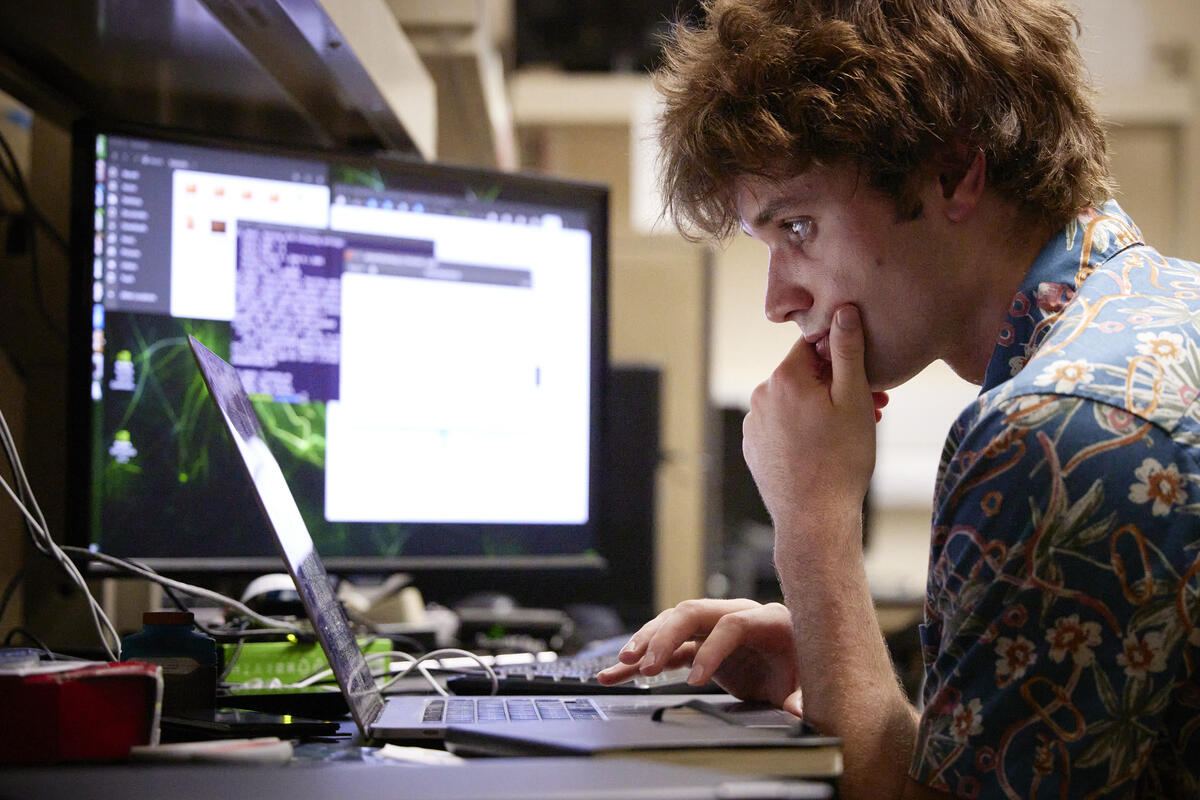It is a Friday morning in August and students in UNLV’s Research Experiences for Undergraduates (REU) Smart Cities program are gathering in for their final presentations.
The 10 students in this year’s NSF-funded program come from as far away as Rochester Institute of Technology in New York and as close as the University of California, Santa Barbara. They’ve spent the entire summer in Las Vegas, living in UNLV’s residence halls and working with UNLV engineering faculty mentors on hands-on research projects.
“In high school I had a professor who was passionate about technology and making things,” shares Eric Volotao, an electrical engineering sophomore from Penn State University. “We’d create robots, learning at our own pace. I realized then that I really wanted to create something new but that could help people.”
Building Success Skills for STEM Careers
The program’s goals are two-fold: to accelerate advances building intelligent, safe, and secure communities with a focus on mobility and to point students toward research problems that are not only interesting but also critical to society — a perfect fit for Volotao's interests.
“I wasn’t sure what this program would really be but it has shown me how to conduct research, what to expect from mentors, how to write papers, and gave me information about future graduate school possibilities.”
Electrical engineering professor and the grant's program investigator Brendan Morris explains, “I regret that I didn’t have experience researching as an undergraduate – it is so important when applying to graduate school or for jobs. Programs like this give students an opportunity to see if research is something they really want to pursue. And it is personally gratifying for me because I love mentoring students and helping them acquire skill sets they didn’t previously have.”
Sam Sokalzuk, an electrical engineering student from Rochester Institute, understands this very well. He worked with LiDAR, a remote sensing system, in high school but didn’t have any coding experience before coming to the Smart Cities program. His research work over summer included learning Python programming and building a hardware-software system to identify pedestrians through a dash cam, which is an important aspect of driver-assistance systems and self-driving cars in future smart cities.
But perhaps time management was the most critical skill he gained. “One of my biggest takeaways is the importance of having a good balance of work and outside activities,” said Sokalzuk. “Since coding was new to me, I was really overwhelmed when I got here and overworked myself. But there are some really good restaurants within walking distance of campus, and the recreation center is great. I would definitely recommend getting out and enjoying the city.”
The program also incorporates elements of career planning.
“We have weekly guest speakers who are at the top of their field, some of whom have started their own companies,” said electrical engineering professor Sarah Harris, who was co-principal investigator on the grant program. “They come to share not only their expertise, but also their personal experiences and paths that got them to where they are today.”
Students also engage in co-curriculars like learning how to do literature searches and how to communicate their research.
Harris, who participated in a REU herself as an undergraduate student, was able to incorporate some of her own experiences into the program.
“It is really important to have mentors who are committed to working with the students, meeting with them weekly, and helping guide their research,” said Harris. “In addition to Brendan and myself, we had eight other faculty and our lab director working directly with students.”
Although each project was determined by the mentor, students conducted their own work and made their own contributions.
“It is so different from just sitting in a classroom and digesting information,” says Morris. “Researching means figuring out a lot on your own and troubleshooting. It really builds their confidence and problem-solving skills.”
Mechanical engineering senior Steven Nguyen who spent the summer designing a braking control algorithm that he was able to install and test on a real autonomous vehicle, states, “The best part is getting to dive into research as an undergraduate and contribute to the greater community.”
REU Smart Cities will be back at UNLV again next summer for its third and last year. With roughly 10% of applicants accepted, it is a competitive program. However, Morris and Harris are already planning their next REU Site proposal to be able to continue offering this important experience to additional students in the future.
UNLV Undergraduate Summer Research Opportunities
Interested in boosting your skills for a career in the sciences? The Office of Undergraduate Research is your connection to research programs at UNLV. Here are just a few opportunities, the office offered students this summer.
Smart Cities
Smart Cities is an NSF-funded Research Experiences for Undergraduates program at UNLV. It educates and inspires undergraduate researchers to address the challenges of building intelligent, safe, and secure Smart Cities with a focus on mobility.
Mechanisms of Evolution
Mechanisms of Evolution is an NSF-funded Research Experiences for Undergraduates program at UNLV. It provides undergraduates with hypothesis-based projects that investigate one or more mechanisms of evolution, promotes careers in science, reinforces the connection between genetics and evolution, and highlights the accomplishments of evolutionary scholars.
Nevada INBRE UROP
The Nevada IDeA Network of Biomedical Research Excellence Undergraduate Research Opportunities Program is INBRE’s flagship undergraduate research program that prepares underrepresented undergraduates for entry into graduate school.



